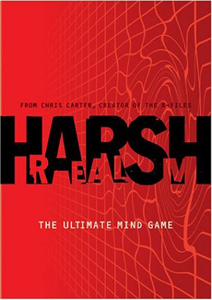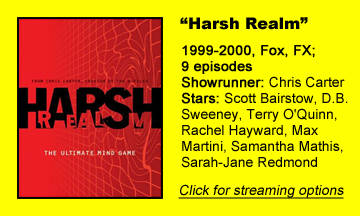In the February 2000 “X-Files” episode “Sein Und Zeit,” a man questioned by Mulder and Scully narrows down the timeframe of a crime by the TV show he was watching: “I never heard of it before. It was good,” the man says. In an example of Chris Carter’s heavy-handed joke-making and cockiness, the show within the show is his own “Harsh Realm,” which had been canceled by Fox in Fall 1999 after three episodes. (The remaining six aired in 2000 on FX.)
‘It was good’
But to be fair, “Harsh Realm” is good. Not great, not world-changing, but professionally good in that Ten Thirteen way. It features the pervasive gray mood of “The X-Files” draped over a different story: A U.S. soldier, Tom Hobbes (Scott Bairstow), plugs into a virtual reality to take out Realm conqueror Santiago (Terry O’Quinn). “It’s just a game,” his commanding officer explains, and that’s also the show’s tagline, the equivalent of “The truth is out there.”
But while the truth might be found somewhere in “The X-Files,” Harsh Realm isn’t a game: Carter is more interested in ironies in his third program (“Millennium” had been canceled earlier in 1999). This is a genuine frontier, and Santiago is making inroads toward a real-world takeover too.
Meanwhile, Hobbes is not a philosopher or deep thinker like his historical namesake, but rather someone who takes action and is driven by feeling. His ally, Mike Pinocchio (D.B. Sweeney) is not a liar or a wooden man, but a straight shooter who is so brash – he keeps threatening to eat Hobbes’ dog, Dexter – that we know he doth protest too much and truly has heart of gold.
At first blush, “Harsh Realm” should’ve been a hit, since it came out in the year of “The Matrix.” But 1999 was perhaps the most quality-packed movie and TV year ever, and Carter’s star had been on the decline for a couple of years.
I watched one episode of “Harsh Realm,” and thought it would be too much intellectual and logistical work to keep up with (In my house, this was still the days of VCRs rather than DVRs). I later picked up the DVD set, but I understand why people didn’t tune in: layered, moody mythology burnout.
That Carter (and Snow) stamp
With Mark Snow providing the score and the greater Vancouver area providing the settings – mostly forests and rundown buildings – “Realm” has the Carter stamp. But actually, the mythology isn’t all that complicated. In these nine episodes, it’s content to let viewers raise questions on their own and know they’d probably be addressed at some point (whether in episode nine or Season 9, it would be hard to say).
For example, I wondered what is distinct about Harsh Realm (an exact copy of reality, down to every man, woman and child) that makes it ripe for Santiago’s takeover. I got my answer in “Camera Obscura” (episode 9), which flashes back to the terrorist bomb that wipes out New York City, part of the military’s terrorist-attack simulation.

But these episodes are mostly standalones that get creative with weird computer science. But not as creative with the baseline narratives: Our two heroes strategize to take a bridge from the enemy (4, “Kein Ausgang”), get thrown into a prison work camp (5, “Reunion”), and are caught in a Hatfields-and-McCoys scenario (9).
(The mute healer Florence, played by Rachel Hayward, is the third lead, and Dexter the fourth, but weirdly, they are simply left out of the story sometimes.)
Less clichéd episodes include “Three Percenters” (6), in which a glitch in the Matrix – I mean, the program – causes evil doppelgangers to emerge from a lake; and “Manus Domini” (7), wherein a nameless VC (virtual character) healer (Apollonia Vanova) trades her life for Pinocchio’s and Hobbes wins over a Santiago soldier (Raymond Cruz, later of “Breaking Bad”) by saving him from a land mine.
An unusual love story
Still, “Realm” does pull off an unusual love story. Hobbes and pregnant Sophie (Samantha Mathis) happily live in the real world in the pilot episode, then their connection continues via voiceovers reflecting Hobbes’ (and sometimes Sophie’s) inner thoughts.
In other cases, “Realm” squanders opportunities to create a bigger ensemble too root for, something that would’ve allowed it to compete with the “Buffys” and the “Roswells” and the “Freaks and Geeks.” (Well, that last one was also being canceled, but you know what I mean.)
Cruz’s Sgt. Escalante gets killed (“digitized”) in a flash around a corner; he could’ve been a great ally, given his prior connections. And as noted, the screenwriters regularly set Florence and Dexter to the side. (Dexter just disappears from the narrative without comment. But at least he doesn’t get eaten.)
Accidentally character-driven
“Realm” doesn’t want to be character-driven, but it almost is anyway. Bairstow is a good Everyman, with his soft voice providing a nice contrast to Hobbes’ military bearing, and Sweeney is spot-on as one of those gruff jerks we like anyway. Santiago is a scary, cool presence.
His second-in-command, Waters (Max Martini), was Hobbes’ pal in the real world, so we suspect he might turn back to good. As Inga Fossa, Sarah-Jane Redmond (the Devil on “Millennium”) is the Cigarette-Smoking Man equivalent, standing in the shadows and working every possible angle for her own mysterious ends.
But there’s not a Duchovny or an Anderson or that extra level of “right place, right time” TV magic. “Harsh Realm” is a workmanlike show, effectively putting “The X-Files” into the Matrix to create a world that’s pleasant to drift off to as you think about whether VCs are human too and whether a virtual reality is as real as real reality. Meanwhile, the awesome title theme gets lodged in your brain.
Would “Harsh Realm” have become something more than a brainy diversion if given more time? As with the big questions raised by the series itself, we’ll never know for sure.


